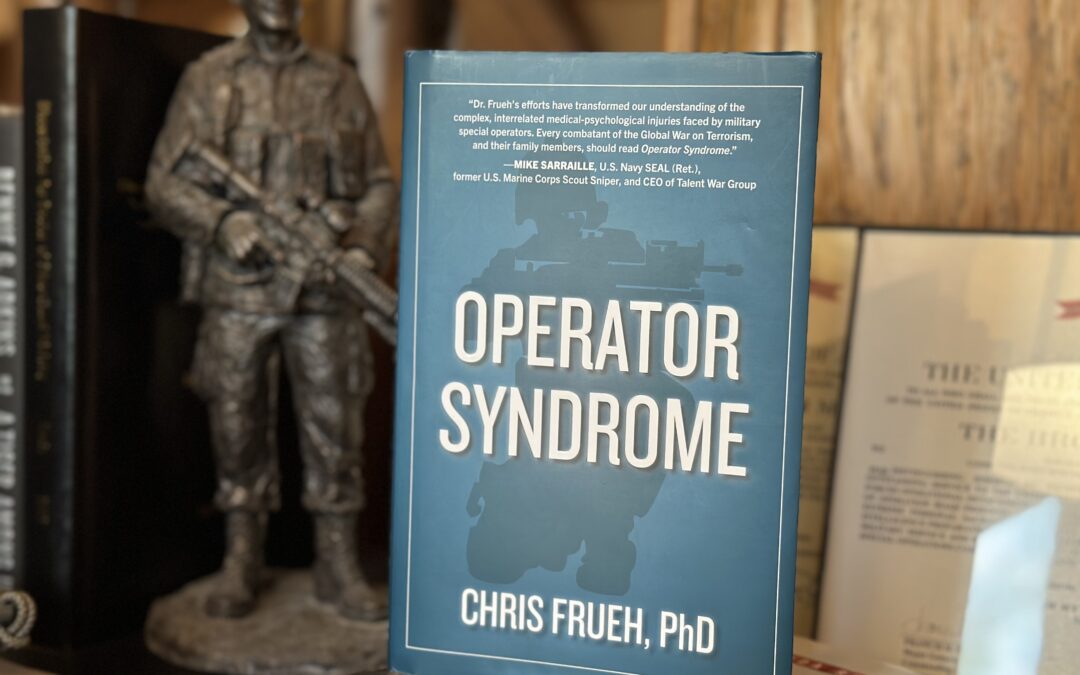While book reviews often include a biographical sketch of the author, a summary of the contents, and a critical evaluation, this review will not be formal as I want to dive right into the contents with an abbreviated evaluation. Bottom Line Up Front (BLUF), I encourage all service members to read this book especially if you have served in our special operations community.
The author of Operator Syndrome is Dr. Chris Frueh, a clinical psychologist who has worked with veterans for over thirty years. Educated, experienced, and practical in his approach. This is one feature that I have appreciated a lot since entering academia and higher learning, finding individuals who are knowledgeable and experienced in their particular field. Not every professional is equipped to work with our combat veterans. Stories abound of the frustration combat veterans have when seeking counseling. I too have had my share of poor counselors who attempted to reduce my six combat rotations as nothing more than a troubled childhood or sin with no resolution. Dr. Frueh gets it and why this book is important.
Besides defining Operator Syndrome, the book contains eighteen brief chapters reviewing the conditions associated with Operator Syndrome. The eighteen conditions addressed in the book are: traumatic brain injury, sleep disturbance and sleep disorders, hormonal dysfunction, chronic pain and headaches, depression, anxiety, anger, hypervigilance, posttraumatic stress disorder, substance abuse, perceptual system impairments, cognitive impairments, marital and family concerns, intimacy concerns, military-to-civilian transition concerns, toxic exposure illnesses and cancers, existential concerns, and suicide. With each chapter, Dr. Frueh shares insights on practical steps that can be taken along with recommended resources for additional reading.
While each chapter is valuable in becoming better informed to address health concerns with one’s primary care, as I have done myself after reading the article on Operator Syndrome published in The International Journal of Psychiatry in Medicine in 2020, what I found to be the most important was the third part of his book that puts it all together. The practical application. The journal article was very insightful as it helped shape many conversations with my primary care on my sleep disturbance, chronic headaches, and testosterone levels. Yet the book’s third part provides practical steps for everyday living that all combat veterans need to read and follow. For within the last five chapters of the book, Dr. Frueh shares treatment and coaching protocols, discusses various medications and treatments including the Stellate Ganglion Block (SGB), regenerative medicine, Ketamine infusion, and even psychedelics. But the most valuable, in my opinion, is the chapter on lifestyle and habits that includes a section on recovery practices. Simple practices that help a combat veteran regulate and remain in the present with their family. Practices that help one growth and thrive after war, which is what every combat veteran and spouse desires.
War may have changed us, but it doesn’t have to defeat us now that we are home! Pick up a copy of Operator Syndrome and become better informed on the impact that a high allostatic load has had on your body and mind after years of service and in combat. Share the book or the journal article with your primary care so you have the words to express what it is that you are struggling with, a common operating picture so to speak. Be your own healthcare advocate and speak up. And most importantly, don’t quit!
DOL
Bibliography
Frueh, Chris. Operator Syndrome. Hong Kong: Ballast Books, 2024.
Frueh BC, Madan A, Fowler JC, Stomberg S, Bradshaw M, Kelly K, Weinstein B, Luttrell M, Danner SG, Beidel DC. “Operator syndrome”: A unique constellation of medical and behavioral health-care needs of military special operation forces. Int J Psychiatry Med. 2020 Jul;55(4):281-295. doi: 10.1177/0091217420906659. Epub 2020 Feb 13. PMID: 32052666.
About Dr. Frueh taken from the book Operator Syndrome, p. 251
“Chris Frueh, PhD, is a clinical psychologist and professor of psychology at the University of Hawaii, Hilo. He has over thirty years of professional experience working with military veterans, service members, special operators, and private defense contractors. He has conducted clinical trials, epidemiology, historical epidemiology, and neuroscience research. He has co-authored over three hundred scientific publications, including a graduate textbook on adult psychopathology. Previously, he was a tenured professor at the Medical University of South Carolina and Baylor College of Medicine.
He has testified before U.S. Congress and served as a paid consultant for the Department of Defense, Veterans Affairs, the U.S. State Department, and the National Board of Medical Examiners. He has also published commentaries in National Review, Huffington Post, The New York Times, Time, Men’s Journal, and Special Operations Association of America. He has been quoted or cited in The Wall Street Journal, The Economist, The Washington Post, Scientific American, Stars and Stripes, USA Today, Men’s Health, Los Angeles Times, Reuters, Associated Press, and NBC News, among others.
He devotes time to SEAL Future Foundation, HunterSeven Foundation, Special Operations Association of America, Boulder Crest Foundation, Military Special Operations Family Collaborative, The Mission Within, VETS, Inc., and Big Country Veterans. He has also published nine historical crime novels, including They Die Alone (2013) and, most recently, A Season Past (2019).”
You can find more about Dr. Chris Frueh and his work at https://chrisfrueh.com

